

Pity is Not Progress. For the uninitiated, Istvan’s perspective boils down to the medical model of disability: the idea, popular since the 19th century, that disabilities are medical conditions in need of treatments and cures.
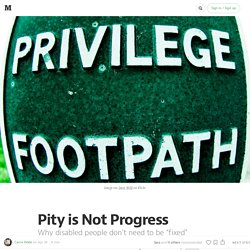
It defines disabled bodies as deficient and therefore “the root of the problem” (to borrow Istvan’s phrase) when it comes to disabled people’s diminished access and social position. It’s a close cousin of the oh-my-god-poor-you tragedy model, in which disability is a disadvantage to be either overcome (people love that) or succumbed to. Istvan says millions of Americans are “suffering from mobility issues.” “We could forever change the hardship of physical disability in America and worldwide.” Suffering, hardship — his understanding of disability clearly begins and ends here. The medical model is the comfortable one for most people because it lets our dominant cultural ideas of disability — namely, that it sucks and is to be avoided — reign unchallenged.
Life Expectancy at Birth (in years), by Race/Ethnicity. Jared Diamond: How societies can grow old better. Perceptions of Aging across 26 Cultures and their Culture-Level Associates. HelpAge International. HelpAge helps older people claim their rights, challenge discrimination and overcome poverty, so that they can lead dignified, secure, active and healthy lives.

In the past year, we have reached 1.5 million of the world’s vulnerable older people and their families, including improving pension schemes in 14 countries and supporting 250,000 older people in accessing health services. Read more about our achievements. We work to address the following issues that affect older people worldwide: What happens after the Millennium Development Goals expire in 2015? Find out how we are making sure older people are included in the post-2015 development framework.
National Institute on Aging. So_far_away_twenty_questions_about_long-distance_caregiving. What it means to "hold space" for people, plus eight tips on how to do it well - Heather Plett. When my mom was dying, my siblings and I gathered to be with her in her final days.
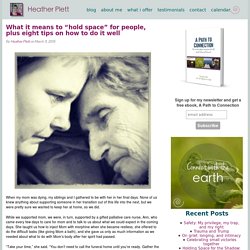
None of us knew anything about supporting someone in her transition out of this life into the next, but we were pretty sure we wanted to keep her at home, so we did. While we supported mom, we were, in turn, supported by a gifted palliative care nurse, Ann, who came every few days to care for mom and to talk to us about what we could expect in the coming days. She taught us how to inject Mom with morphine when she became restless, she offered to do the difficult tasks (like giving Mom a bath), and she gave us only as much information as we needed about what to do with Mom’s body after her spirit had passed.
“Take your time,” she said. “You don’t need to call the funeral home until you’re ready. Ann gave us an incredible gift in those final days. In the two years since then, I’ve often thought about Ann and the important role she played in our lives. What does it mean to hold space for someone else? An Overnight Nursing Home for Dementia Patients — Atlantic Mobile. Many with Alzheimer's are at their most active after dark.

A New York care facility has launched an after-hours camp-style program to entertain them until the morning—and help their caregivers get some sleep. In her Manhattan apartment, Josephina Deltejo is trying to coax her 84-year-old mother Brunhilda Ortiz to get ready to leave the house. As she does most nights, Deltejo makes up a story to get her mother, who has dementia, to cooperate. In Spanish, Deltejo asks her mother if she would rather go to Miami or the Dominican Republic. “She says she wants to go to the Dominican Republic,” Deltejo translates, and then she helps the older woman gather her things and go downstairs to a waiting van.
Deltejo says her mother was once a proud, hard-working immigrant who raised four children on her own, but she has changed. For months, Ortiz would sleep during the day and be up much of the night wandering around the apartment. “She wanted to sweep the floor. “We’re engaging them on their level. Age Of Happiness: These 60-And-Older Seniors Will Destroy Your Age Stereotypes. How old do you think the pole dancing woman is pictured above?

You might be surprised to learn she’s 61-years-old, but that’s why you can’t trust stereotypes about age. Age really means nothing; it’s simply a number not a definition of an individual’s capabilities. One person runs marathons at 61, while another person of the same age can’t run down the block. Real-Life 'Notebook' Couple Dies Hand-in-Hand. "They weren’t fancy.
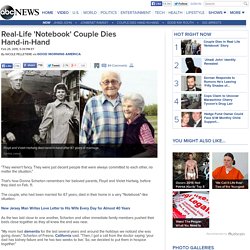
They were just decent people that were always committed to each other, no matter the situation. " The “golden years” are gone: Why retirement is hell for American women. Imagine you are a woman in public service in any number of states across this country.
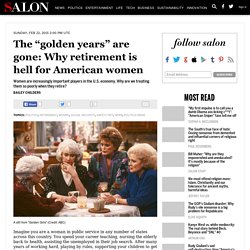
You spend your career teaching, nursing the elderly back to health, assisting the unemployed in their job search. CNN's World's Untold Stories: Dementia Village. 100-105-vickers.pdf. Photo Series Of Seniors Shatters Every Aging Stereotype. Bones can become thinner and more brittle in old age, especially in women, sometimes resulting in the fragile bone condition called osteoporosis.
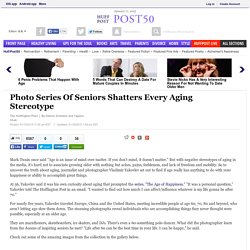
Thinning bones and decreasing bone mass can put you at risk for falls that can easily result in broken bones. Be sure to talk with your physician about what you can do to prevent osteoporosis and falls. While a healthy diet and regular exercise can keep your heart healthy, it may become slightly enlarged, your heart rate may lower, and the walls of the heart may thicken. Getting older can cause changes in your reflexes and even your senses. State of Metropolitan America Indicator Map.
British Heart Foundation: Older People Have Sex Too. By Gwen Sharp, PhD, Dec 12, 2008, at 01:45 pm Last year the British Heart Foundation released this ad (found at the Mail Online) encouraging people to get a half hour of exercise each day: It sparked some complaints, presumably because it says sex so openly and has a naked man in it.

But it’s kinda neat to see an ad that shows middle-aged people with bodies that don’t necessarily fit our cultural beauty ideals, and acknowledging that they have sex. Portraying Age in Vogue. By Gwen Sharp, PhD, Jan 8, 2009, at 06:17 am Tracey H.

(of Unapologetically Female) sent in this series of photos from the French version of Vogue (found at Miss at la Playa). The Economics of Beauty. Designed With Who in Mind?! By Lisa Wade, PhD, Apr 23, 2009, at 11:14 am Apparently age, maturity, perspective, and wisdom does not exempt you from being pigeon-holed into rigid and ridiculous gender categories. Behold the Depends for men and women advertising campaign sent in by Julie C. Getting Older, As A Woman, In Hollywood. “Body Lexicon” for Aging Female Bodies. Lisa recently asked, “What warrants a slide show on a newspaper’s website?” Denise L. sent in an article from the Life section of the Globe and Mail website called “Obsession with Aging Female Parts Has Created a New Body Lexicon” that brings up similar questions about what topics are given attention. Understanding Gender Differences in Life Expectancy. By Lisa Wade, PhD, Nov 22, 2009, at 10:18 am Flowing Data presented a number of figures revealing data about life expectancy (via).
The Execution of Old Men. By Lisa Wade, PhD, Dec 19, 2009, at 10:23 am Chris Uggen, fellow sociologist and editor of Contexts magazine, put together a graphic for Public Criminology comparing the current age of death row inmates in the US with their age at arrest (in the title, I assumed they were mostly men, but I don’t know): So the median age at arrest is 27 and the median current age is 43. This illustrates the lag time between arrest, conviction, sentencing, and execution. It also creates the conditions for what Uggen calls the “graying of prison populations.” The Relationship Between Health Spending and Life Expectancy. By Lisa Wade, PhD, Jan 10, 2010, at 10:16 am The figure below, sent in by Muriel M.M. and Josh P., shows the relationship between health care spending (on the left) and life expectancy (on the right). Perhaps the most stunning finding is what appears to be a rather loose correlation between the two. But a second finding is the inefficiency of U.S. spending (see it at the left top of the figure?)
: it is far above the other states included and is, nonetheless, translating into less-than-stellar results (if you measure by life expectancy). Via National Geographic. Age, Education, and Functional Decline. OK Cupid Data on Sex, Desirability, and Age. The data analysis coming out of dating site, OK Cupid, is kind of awesome. Age, Gender, and the Academy Awards. Older Women Want More Sex. The Graying of America. Hyundai Commercials Mock Young Drivers. The Graying of American Mothers. Unemployment among Workers 55+ Years Old. One thing we’ve been interested in, and posted various images about, here at Soc Images is the different ways people experience the current economic crisis.
Illustrating a “Normal” Lifecourse. Cross-National Comparisons of Years in Retirement. U.S. Population Aging, by State. The Social Construction of Age: How Old is “Too Young”? Care Vacuums: The Nearness of Nursing Homes. Beauty and the Double Standard of Aging. Tailoring Coupons by Age and Gender. The Invention of “Adolescence” U.S. Population Aging, by State. Social Security Is In Danger. Assisted-Living Prison Cells? On Aging Prisoners. What Does 90 Look Like? The Social Construction of Aging. Economic Well-Being among Older Americans. In Hollywood, Leading Men Get Older; Love Interests Don’t.
Grandparents as Support System. Medicare vs. National Health Care: How U.S. Seniors Do in Cross-National Perspective. Constructing Adulthood in an Age of Uncertainty.